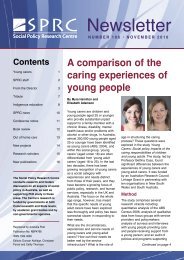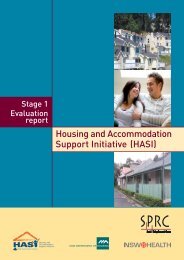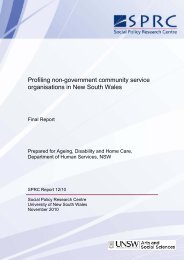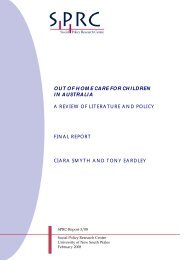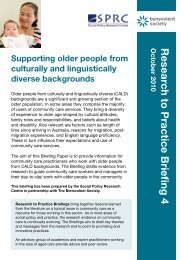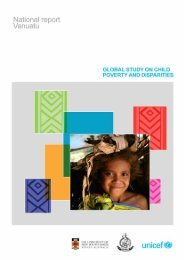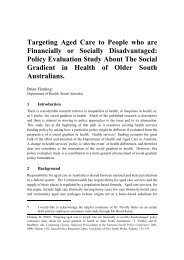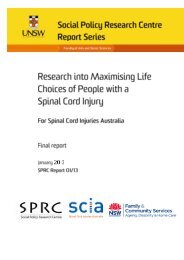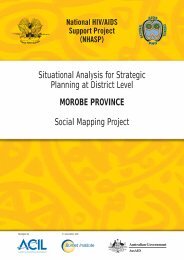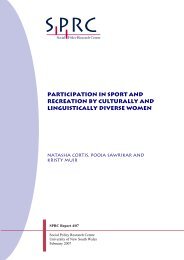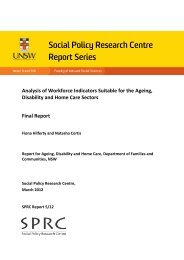A Strategic Assessment of the Children's Services Industry
A Strategic Assessment of the Children's Services Industry
A Strategic Assessment of the Children's Services Industry
- No tags were found...
Create successful ePaper yourself
Turn your PDF publications into a flip-book with our unique Google optimized e-Paper software.
STRATEGIC ASSESSMENT OF THE CHILDREN’S SERVICES INDUSTRYeducation where this is not already available, or to increasing its availability in terms <strong>of</strong> <strong>the</strong>hours and length <strong>of</strong> time that children are entitled to attend. The UK’s Effective Provision <strong>of</strong>Preschool Education (EPPE) study (Sylva et al., 2003) affirms <strong>the</strong> effectiveness <strong>of</strong> highquality preschool education in improving outcomes for children considered at risk <strong>of</strong> schoolfailure, but it makes <strong>the</strong> point that two years <strong>of</strong> access to preschool education is much moreeffective than a single year preceding school.In Sweden, preschool is available to all children between <strong>the</strong> ages <strong>of</strong> one and six (OECD2001) and 68 per cent <strong>of</strong> all children below <strong>the</strong> age <strong>of</strong> six are enrolled in preschool (Rauch,2007). New Zealand has recently introduced an entitlement to 20 hours per week <strong>of</strong> free earlychildhood education at teacher-led services for all three and four year olds (May, 2007). In <strong>the</strong>UK, three and four-year-olds are entitled to 12.5 hours a week for 33 weeks <strong>of</strong> <strong>the</strong> year andthis is being extended (DfES 2003). In Australia, a number <strong>of</strong> jurisdictions <strong>of</strong>fer universalaccess to preschool education in <strong>the</strong> year before school, but <strong>the</strong>re are serious gaps in provisionin a number <strong>of</strong> regions (Press 2006). The newly elected Australian government has promised15 hours a week <strong>of</strong> preschool education for all four year old children (Rudd et al., 2007). InCanada, fewer than 20 per cent <strong>of</strong> children find a place in a regulated service in <strong>the</strong> yearsbefore school (OECD 2003 p.10).However, attention to one or two years <strong>of</strong> preschool before <strong>the</strong> commencement <strong>of</strong> compulsoryschooling can divert attention from <strong>the</strong> needs <strong>of</strong> children below preschool age. For workingparents in particular, <strong>the</strong> use <strong>of</strong> unregulated, non-family care increases when <strong>the</strong> availability<strong>of</strong> formal care is limited (see for instance <strong>the</strong> experience <strong>of</strong> Canada, OECD 2003 p.66). Thus<strong>the</strong> UN interprets ‘every child’s right to education as beginning at birth and closely tied to <strong>the</strong>right to development’. In this way ‘education’ is not conceived <strong>of</strong> as ‘schooling’, ra<strong>the</strong>r it isenvisaged as a community service for both children and parents (Woodhead and Moss, 2007).The goal <strong>of</strong> universal access is not just a question <strong>of</strong> availability. It also raises questions <strong>of</strong>how to develop a system that does not result in groups <strong>of</strong> children being excluded orsegregated. Hence, <strong>the</strong> first Starting Strong report stressed <strong>the</strong> need to give particular policyattention to children in need <strong>of</strong> special support, and <strong>the</strong> second reinforced this call with itsrecommendation to increase resources within universal programmes for children with diverselearning rights. This principle is upheld by <strong>the</strong> UN General Comment No. 7 which advocatesfor all children to be guaranteed access to services with particular attention paid to those mostvulnerable (2005). Disability, cultural and linguistic factors, poverty, and family dysfunctionare among <strong>the</strong> factors that might cause families to be marginalised within, or disenfranchisedfrom, ECEC. Yet appropriately resourced, high quality, responsive early childhood servicesare <strong>the</strong> very services that can directly provide, or be a platform for, <strong>the</strong> provision <strong>of</strong> <strong>the</strong>additional supports and interventions that facilitate children’s successful social andeducational inclusion. In relation to immigrant children, Pascal and Betram regard ECECprogrammes as ‘key sites for enacting national goals for social inclusion and <strong>the</strong> creation <strong>of</strong>new citizens’ (2006, 1).Despite such well documented potential, Starting Strong I noted that in many countries <strong>the</strong>funding provided to support families and children with additional needs was <strong>of</strong>ten insufficientand irregular (2001). The capacity <strong>of</strong> early childhood systems to inclusively and effectivelyrespond to families with additional needs is affected by <strong>the</strong> base from which <strong>the</strong>y start.Sweden seeks to provide all children with access to mainstream services, with extra fundingallocated to enable <strong>the</strong> provision <strong>of</strong> extra individualised attention to children who requirespecialist support (OECD 2006). The Sure Start programme in <strong>the</strong> UK used <strong>the</strong> notion <strong>of</strong>‘progressive universalism’ to build up a system <strong>of</strong> supports to children and families that in <strong>the</strong>first instance target children in disadvantaged areas. Whilst Sure Start programmes were24



